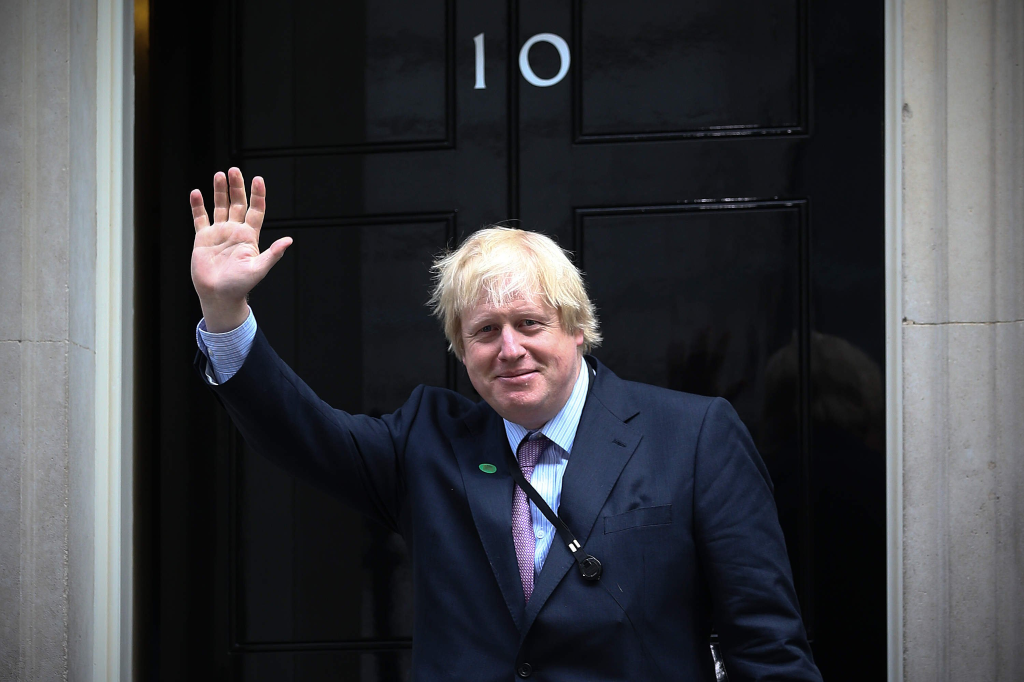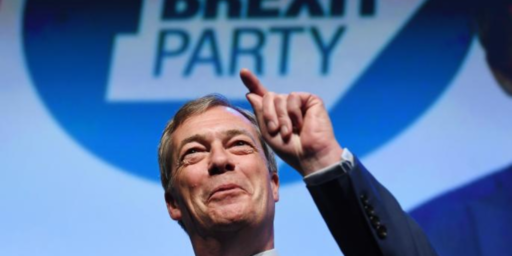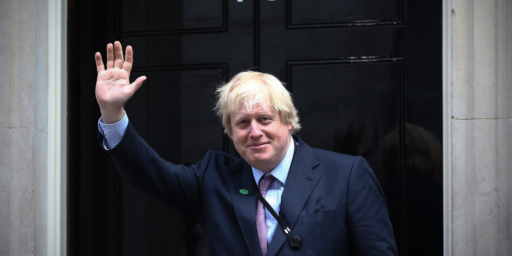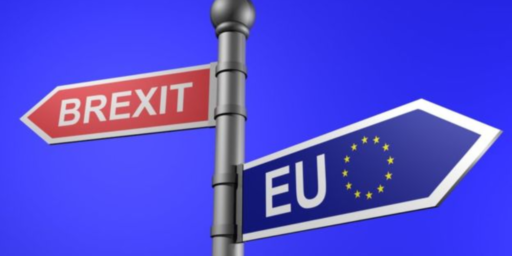Boris Johnson Takes Strong Lead In Fight For Conservative Party Leader
Boris Johnson is one step closer to becoming the next Prime Minister of the United Kingdom.

As expected, former British Foreign Secretary Boris Johnson, who is the top candidate to succeed Theresa May as head of the Conservative Party and Prime Minister of the United Kingdom, came out on top in the first round of voting among Tory members of the House of Commons, what was surprising was the strength of his victory:
LONDON — Boris Johnson finished well ahead of his rivals on Thursday in the first round of balloting among Conservative lawmakers in the race to replace Theresa May as the party’s leader, taking a significant step toward becoming Britain’s next prime minister.
In an unexpectedly convincing victory, Mr. Johnson, who was elected mayor of London for two terms, secured 114 votes from the 313 Conservative lawmakers; his closest competitor, Jeremy Hunt, the foreign secretary, had 43.
If, as seems likely, Mr. Johnson maintains his current level of support in subsequent rounds of voting, he would be guaranteed a place in the final list of two candidates, one of whom will ultimately be selected by Conservative Party members.
That puts him in a very strong position to succeed Mrs. May, given that he is popular with Conservative activists who generally give him a warm reception at party conferences and who largely favor Mr. Johnson’s tough stance on Brexit.
Most analysts believe that the contest is Mr. Johnson’s to lose and perhaps with that in mind he has avoided broadcast interviews and given just one news conference during which he took only six questions.
Those tactics appear to have paid off in Thursday’s voting, confirming his position as the clear favorite and — barring mishaps or gaffes — effectively turning next week’s voting into a contest for the right to join him on the shortlist of two.
Nevertheless, the position of front-runner is historically treacherous in Conservative Party leadership races that, over the decades, have invariably produced upset winners. Mr. Johnson’s opponents believe that he will face more pressure public scrutiny, and that he could yet trip up before the ultimate choice is made.
There are likely to be at least two more ballots before the final two candidates are named next week, and it remains an open question who will emerge as Mr. Johnson’s strongest rival.
Michael Gove, the environment secretary, came in third on Thursday with 37 votes, followed by Dominic Raab, the former Brexit secretary, with 27; Sajid Javid, the home secretary, with 23; and Matthew Hancock, the health secretary with 20. Three candidates — including the two female contenders — were eliminated under rules that required them to secure at least 17 votes; their supporters will be courted by the seven remaining contenders.
Rory Stewart, the international development secretary whose centrist campaign against a no-deal Brexit has won praise, survived the first ballot by winning 19 votes, exceeding the expectations of many.
Survival in the first ballot could be significant because broadcasters are planning TV debates among the remaining candidates, giving them an opportunity to appeal to a wider audience and raise their profile for the future.
Mr. Johnson has not committed to taking part in the debates, and has the least to gain from them. His campaign will have to weigh the dangers of participation against the inevitable charges of running scared if he refuses to do so.
Mr. Gove had been considered Mr. Johnson’s main rival until his campaign was seriously hurt at the start by an admission that he used cocaine two decades ago, a revelation that opened him to accusations of hypocrisy because of his hard-line stance on drugs as a former education and justice secretary. Given that stumble, he will probably be satisfied with his performance, not far behind Mr. Hunt, who had seemed to be gaining momentum.
But there are relatively few votes among the other surviving candidates so the shape of the race for second place is unlikely to become clear until the next ballot, scheduled for Tuesday, which will force out at least one more contender. To survive the next round, candidates will need at least 33 votes.
This is not the first time that Johnson has found himself near achieving the goal of becoming Prime Minister that he’s had for many years. Three years ago, when David Cameron stepped aside as Conservative Party leader after finding himself on the losing end of the Brexit referendum, Johnson was among the top contenders for the position of Tory leader. Instead, he ended up abruptly pulling out of the race, a move that effectively removed the last remaining impediment to Theresa May becoming head of the party and leading to a quicker than expected at the time process to pick a successor to Cameron. Instead of becoming Prime Minister, Johnson had to settle for the post of Foreign Secretary, a position he held until resigning last year as part of the rebellion inside of May’s Cabinet regarding the direction of Brexit negotiations.
The difference between that failed bid for party leadership three years ago and today, of course, is the extent to which the Brexit situation spiraled out of control for May, largely due to her own inability to keep her own party in line thanks to the fact that the Tories have become far more pro-Brexit than they were three years ago. It was clear that things were not going well when, in a historic rebuke that some historians believe had not happened in nearly 800 years, the House of Commons overwhelmingly rejected the Brexit deal that May had negotiated over the course of the past two and a half years. That rejection shook British politics to its core and led to an intra-party challenge to May’s leadership that could have led to her ouster. May survived that vote but was clearly weakened by it, making it much harder for her to put together a Brexit deal that Parliament would accept.
Since leaving the Cabinet, Johnson has used his position and his notoriety to set himself apart by vowing the complete the Brexit process by the October 31st deadline set by the European Union earlier this year when it became clear that the government of Theresa May would not be able to meet the March 29th deadline or the late April extension that was originally granted. In making that promise, though, Johnson has made some rather controversial statements that could prove troublesome down the road;
Mr. Johnson has been vague on how he would deal with Britain’s most pressing challenge, the Oct. 31 deadline for Brexit. On Wednesday he stressed that he was not aiming for a departure from the bloc without any agreement, something that analysts say would involve severe economic risks for Britain.
However, Mr. Johnson has argued for Britain to prepare vigorously for a “no deal” Brexit, saying it would provide leverage in negotiations with the European Union over the withdrawal. According to some news media reports, he has also privately promised hard-line Brexiteers that he would keep open the possibility of suspending Parliament to force through a no-deal departure because a majority of lawmakers have previously voted against that outcome.
To say the least, suspending Parliament would be a radical step but it is one that several of the challengers for the top spot in the Conservative Party have raised as an option if it is appears impossible to cobble together a Brexit deal that can gain the approval of both the E.U. and the House of Commons. If that happened, though, it would essentially make a no-deal Brexit inevitable, with all of the negative consequences that are likely to come from that. Nonetheless, given the extent to which the pro-Brexit position has taken over the Conservative Party Johnson’s hardline position is likely a big part of the reason why he has such strong support among Tory Members of Parliament.
At the very least, I would expect that Johnson will maintain his lead through subsequent rounds of voting and will end up being among the top two candidates presented to the wider membership of the Conservative Party in late July. Additionally, it’s hard at this point to see any of other candidates overtaking him to win that final vote to succeed May. In addition to his strong support for Brexit, a change in the position he held prior to the Brexit referendum in 2016, Johnson has long had a populist appeal that will likely serve him well during the campaign for the support of the party members. Indeed, as several observers of British politics have noted, the only thing appears to stand between Johnson and No. 10 Downing Street s the chance that he’ll commit some gaffe that would be damaging to his campaign. In that sense, I suppose, he’s in a similar position to another gaffe-prone politician who finds himself at the top of the polls, former Vice-President Joe Biden.
Johnson, of course, does not come without his own degree of controversy. Between various aspects of his past and his bombastic style (not to mention his haircut), he has often been referred to as a British version of Donald Trump. While the analogy is not perfect, it isn’t very far off either. Much like Trump, Johnson has relied quite often on a populist message to rally supporters behind him, and he seems to share many of Trump’s views on the European Union and other issues. Additionally, while May and Trump often clashed both in public and in private, one imagines that Prime Minister Johnson and President Trump would get along quite nicely. While that may bode well for the continuation of the “special relationship” between the United States and the United Kingdom, it may also signal policy changes in both nations that will not be good in the long term.
In any event, the stars seem to be aligning for Boris Johnson this time around. Whether that’s a good thing or not is another question.





It would appear that Britain has now reached the “Hold my beer and watch this!” moment in the Brexit melodrama.
Send in the clowns.
I have to quote, I think Balloon Juice,
I confess I still do not understand Brexit. Are they really doing all this just so wealthy Brits, like May’s husband, can avoid the EU tax avoidance directive and turn the UK into a shithole tax haven? I haven’t seen any other credible reason.
@michael reynolds: Don’t bother they’re here.
Does it feel to anyone else that Brexit is like the world’s slowest suicide attempt?
I am reminded I haven’t reread Catch 22 in some years. IIRC General Peckham commands Special Services, the guys who provide coffee and donuts and USO shows to the USAAF in Italy. He’s constantly scheming to get the bomber wings assigned under him as part of Special Services (If bombing the enemy isn’t a special service, what is?). He is finally promoted to command of the bomber wings, and at the same time his machinations bear fruit, the bomb wings are moved into Special Services, and he’s made subordinate to his second in command at SS, Lieutenant Schiesskopf, now promoted to general over Peckham.
Looks like Boris supported Brexit only to give himself a shot at Tory party leader and PM. From what I see he may get it, just as the Tory Party collapses.
(Anybody seen the HULU Catch 22? Any good?)
@Kathy: Death by a thousand tiny cuts.
@gVOR08: I watched the first episode, but I didn’t care for it. On the other hand, that type of satire is not my strong suit to begin with. The reviews I read noted that is was true to the book, but they didn’t think it was particularly well done.
A bunch of Johnson-supporters have been trying to turn the whole thing into a coronation, claiming that because Johnson received so many votes in the first round why don’t all the other candidates just drop out and they’ll go to a vote immediately.
Needless to say, those with memories of how Theresa May reached her PMship are not too happy.
Labour looks to be doing its own version of a suicide circular firing squad, and the EU looks to have gotten to the point where they’re just fed up with the whole UK political soap opera and are perfectly willing to just shove the UK out the door Nov. 1. The only thing that is holding the EU back is the potential pickle this puts Ireland in.
I have to quote this from The Guardian:
@grumpy realist: If you mean by “Ireland” the island of Ireland, then yes. If you mean the Republic of Ireland, no. The Republic will remain in the EU and will not have its economy totally disrupted. It does raise the risk of a “hard border” between it and Northern Ireland which violates the Good Friday accord and risks a return to sectarian violence. It also means smuggling will be a growth industry.
@Dmichael: I think the EU realises that the ROI is in the firing lines for a lot of the fallout from a no-deal Brexit so isn’t going to go ahead with one (a.k.a. No More Extensions) unless ROI is willing.
In other words, if ROI indicates they need another 6 month extension from the UK to get really prepared for a no-deal Brexit, the EU will go along with it–provided of course, that the UK asks for one.
The Brits, on the other hand are tearing themselves into pieces–the idiots who are now pushing for jumping off the building end of October with little preparation, insisting that “no deal Brexit” was precisely what the “winning side” voted for, and to hell with the results. “We English are better at anything than Johnny Foreigner, and besides which, they’re all bluffing, anyway!”
These are the same people whose serious suggestion to solve the GFA/Brexit conundrum is that the ROI decide to leave the EU as well and come back under the “U.K. aegis.” We’re not talking about people in touch with reality, here.
Historically, the U.K. has time and time again blundered into non-optimal situations by insisting that the other side “is just bluffing”. It’s now a knee-jerk reaction.